Cambodia: Financial Inclusion and Payment System Development
Much of the rapid expansion in technology has enabled banks worldwide to provide more efficient services to their customers. In Cambodia, technology played a crucial role in expanding the scope of banking to several sections of society in a comprehensive manner. Though the Covid-19 pandemic severely affected many sectors and industries across the world, the response with the help of technology helped governments and industries to recover from it professionally.
“In the mid-2010s, NBC seized the opportunity to advance financial technology by modernising its banking system, especially the payment system. The benefit of this updated technology was highlighted during the Covid-19 pandemic when social distancing was encouraged. Modern payment systems have greatly contributed to the sustainability of business, trade, and investment by offering various payment methods to individuals to reduce operating costs and speed up secure payments,” NBC said in an annual report.
“In addition, modern payment systems enhance the connectivity of regional payment systems and facilitate the transfer of money between Cambodia and the ASEAN region, supporting remittance of foreign workers, exchanges, and cross-border investment,” it added.
With a population of over 16 million, Cambodia currently has 58 commercial banks, nine specialised banks, and 86 microfinance institutions including five MDIs (microfinance deposit-taking institutions), with a total of 2,593 headquarters and branches as well as 4,300 ATMs throughout the country, according to NBC, the central bank and monetary authority of Cambodia.
In 2020, there were approximately 26.35 ATMs per 100,000 adults in Cambodia compared with around 4.3 ATMs per 100,000 adults in 2009. According to the International Monetary Fund, there were around 12.38 bank branches per 100,000 adults in Cambodia in 2021.
According to NBC, 67 percent of the Kingdom’s population have access to formal financial services by 2022, an increase from 59 percent by 2021.
Besides, there are currently some 3.5 million credit accounts and 13.2 million deposit accounts at the country’s banks and microfinance institutions, the bank added.
In Cambodia, NBC introduced several payment systems that helped several customers to conduct banking services in a more convenient and effective way.
The National Clearing System is an interbank settlement system both in KHR and USD using cheques and electronic payment orders.
The FAST Payment System (FAST) is a small-scale KHR remittance and settlement service that can be operated across banking and financial institutions where customers can receive and use funds instantly.
Similarly, the Cambodian Shared Switch System (CSS) is a system that allows a debit card to access network ATM and POS machines of member institutions where the logo of CSS is displayed. This will enhance the efficiency of using debit cards with different ATM and POS machines.
The Online Banking System (OBS) is an interbank payment system between accounts of member institutions using NBC’s online platform.
On the other hand, the Retail Pay System (RPS) is an interbank payment system where users can transfer funds instantly and make payments via mobile phone and QR Code.
Meanwhile, BAKONG Payment is a backbone payment system, using Blockchain technology, where users can make payment transactions across different institutions in both KHR and USD through mobile phones and QR code. According to NBC, it formally introduced the Retail Payment Systems (RPS) in January 2021 to provide additional means of making payments during the Covid-19 pandemic.
“Moreover, the FAST payment system (FAST) has been updated with more features; this system has been primarily launched in October 2021. Large-scale payment systems are also being developed to facilitate gross settlements and reduce the risk in interbank payments, especially payments in the financial markets. Meanwhile, cross-border payments between Cambodia and Malaysia, through the connection between NBC’s BAKONG and Maybank’s M2U systems, were officially launched in August 2021 to facilitate remittances and trade payments between the two countries, which makes it more efficient and affordable for Cambodian workers who are working in Malaysia,” an NBC report pointed out.
“The NBC continues to monitor both the payment systems and the payment service institutions to prevent any potential risks. NBC signed an MoU with the Ministry of Posts and Telecommunications in April 2021 on Cooperation in Technology and Innovation Knowledge Sharing and organised the first workshop on Distributed Technology and Blockchain in May 2021.
Furthermore, NBC has partnered with the Monetary Authority of Singapore and other central banks to launch a research paper on the Foundation of Digital Infrastructures for Inclusive Digital Economies which is the first achievement of Global Foundational Stack Project.”
Source: https://www.khmertimeskh.com/501262733/financial-inclusion-and-payment-system-development-2/


 Thailand
Thailand




